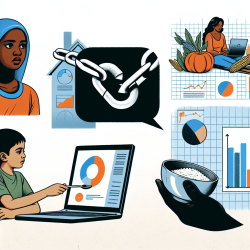Introduction
In the realm of mental health interventions, particularly in low and middle-income countries (LMICs), the challenge often lies in the scarcity of resources and the need for scalable, effective solutions. The research article titled "A qualitative evaluation of a brief multicomponent intervention provided by lay health workers for women affected by adversity in urban Kenya" sheds light on an innovative approach to tackling mental health issues in such settings. This blog post explores how practitioners can leverage the insights from this study to enhance their skills and improve outcomes for children and communities.
Understanding the Intervention: Problem Management Plus (PM+)
Problem Management Plus (PM+) is a brief, multicomponent intervention developed by the World Health Organization (WHO) to address common mental health problems. It is designed to be delivered by non-specialist health providers, making it an ideal solution for settings with limited mental health resources. The intervention consists of five face-to-face sessions that incorporate behavioral activation, stress management, social support enhancement, and problem-solving techniques.
Key Findings from the Kenyan Study
The study conducted in peri-urban Nairobi, Kenya, involved 518 women exposed to adversity, including interpersonal violence. The qualitative evaluation revealed several key findings:
- Positive Impact: Participants and community health volunteers (CHVs) reported significant improvements in mental health and overall well-being.
- Barriers to Scale-Up: The sustainability of CHVs as unsalaried providers was identified as a major barrier to scaling up the intervention.
- Community Acceptance: PM+ was generally well-received, with participants expressing interest in expanding the program.
Implications for Practitioners
Practitioners can draw several lessons from this study to enhance their skills and improve outcomes:
- Adopt Evidence-Based Techniques: Incorporating stress management and problem-solving strategies into practice can enhance the efficacy of interventions.
- Engage Community Health Workers: Training and utilizing lay health workers can extend the reach of mental health services, especially in resource-limited settings.
- Address Barriers to Implementation: Understanding and mitigating structural and psychological barriers is crucial for the successful implementation of interventions.
Encouraging Further Research
While the study provides valuable insights, it also highlights the need for further research to address challenges such as the sustainability of lay health workers and the integration of mental health services into primary care. Practitioners are encouraged to explore these areas to contribute to the development of scalable mental health interventions.
To read the original research paper, please follow this link: A qualitative evaluation of a brief multicomponent intervention provided by lay health workers for women affected by adversity in urban Kenya.










